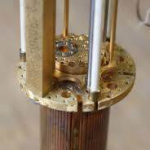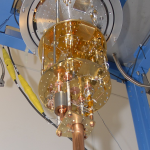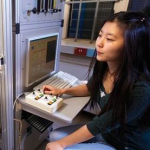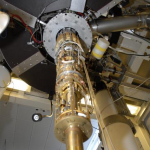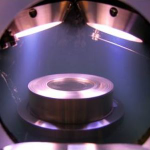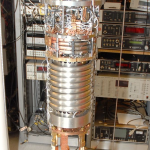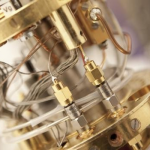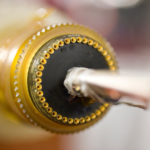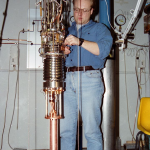

- Photon Transport in a Bose-Hubbard Chain of Superconducting Artificial Atoms
G. P. Fedorov et al., Phys. Rev. Lett. 126, 180503 (2021) - Path-Dependent Supercooling of the
He3 Superfluid A-B Transition
Dmytro Lotnyk et al., Phys. Rev. Lett. 126, 215301 (2021) - Superconductivity in an extreme strange metal
D. H. Nguyen et al., Nat Commun 12, 4341 (2021) - High-Q Silicon Nitride Drum Resonators Strongly Coupled to Gates
Xin Zhou et al., Nano Lett. 21, 5738-5744 (2021) - Measurement of the 229Th isomer energy with a magnetic micro-calorimeter
T. Sikorsky et al., Phys. Rev. Lett. 125 (2020) 142503
Stretchable persistent spin helices in GaAs quantum wells
F. Dettwiler, J. Fu, S. Mack, P. J. Weigele, J. C. Egues, D. D. Awschalom and D. M. ZumbühlThe Rashba and Dresselhaus spin-orbit (SO) interactions in 2D electron gases act as effective magnetic fields with momentum-dependent directions, which cause spin decay as the spins undergo arbitrary precessions about these randomly oriented SO fields due to momentum scattering. Theoretically and experimentally, it has been established that by fine-tuning the Rashba α and renormalized Dresselhaus β couplings to equal fixed strengths α=β, the total SO field becomes unidirectional, thus rendering the electron spins immune to decay due to momentum scattering. A robust persistent spin helix (PSH), i.e., a helical spin-density wave excitation with constant pitch P=2π/Q, Q=4mα/ℏ2, has already been experimentally realized at this singular point α=β, enhancing the spin lifetime by up to 2 orders of magnitude. Here, we employ the suppression of weak antilocalization as a sensitive detector for matched SO fields together with independent electrical control over the SO couplings via top gate voltage VT and back gate voltage VB to extract all SO couplings when combined with detailed numerical simulations. We demonstrate for the first time the gate control of the renormalized β and the continuous locking of the SO fields at α=β; i.e., we are able to vary both α and β controllably and continuously with VT and VB, while keeping them locked at equal strengths. This makes possible a new concept: “stretchable PSHs,” i.e., helical spin patterns with continuously variable pitches P over a wide parameter range. Stretching the PSH, i.e., gate controlling P while staying locked in the PSH regime, provides protection from spin decay at the symmetry point α=β, thus offering an important advantage over other methods. This protection is limited mainly by the cubic Dresselhaus term, which breaks the unidirectionality of the total SO field and causes spin decay at higher electron densities. We quantify the cubic term, and find it to be sufficiently weak so that the extracted spin-diffusion lengths and decay times show a significant enhancement near α=β. Since within the continuous-locking regime quantum transport is diffusive (2D) for charge while ballistic (1D) for spin and thus amenable to coherent spin control, stretchable PSHs could provide the platform for the much heralded long-distance communication ∼8–25 μm between solid-state spin qubits, where the spin diffusion length for α≠β is an order of magnitude smaller.
Phys. Rev. X 7, 031010 (2017)
doi: 10.1103/PhysRevX.7.031010
